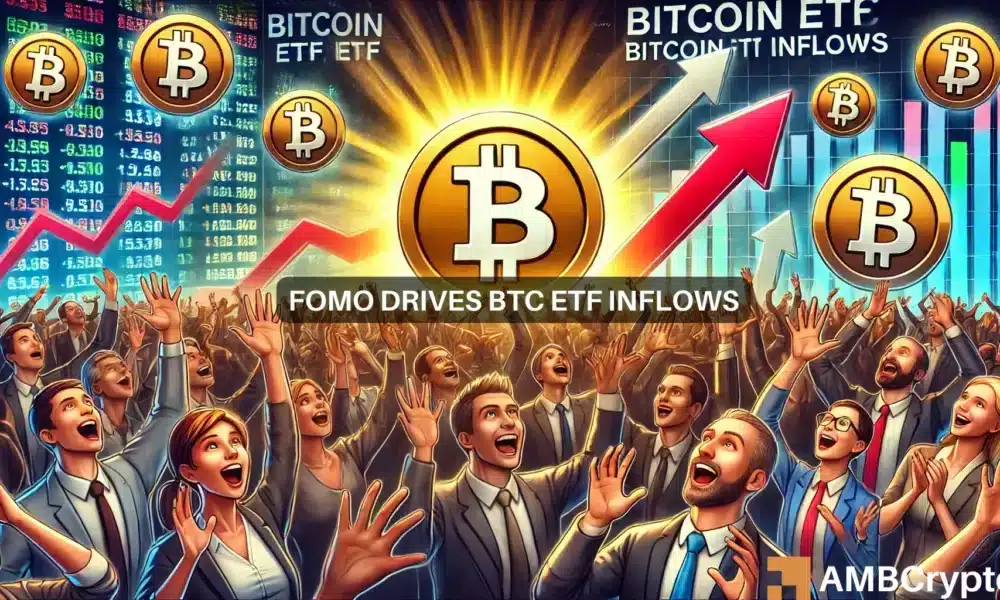The price of Bitcoin [BTC] has continued its remarkable ascent, surpassing all expectations and setting new records in terms of exchange-traded fund (ETF) inflows.
On October 29th, BTC reached a peak of over $73,000, while at the same time, BTC ETFs observed a net inflow of $870 million, as per data from SoSo Value.
This marked the highest single-day net inflow since the beginning of June.
It is interesting to note that such high volumes of inflows are usually seen during market downturns when investors tend to “buy the dip.”
So, the question arises: why are inflows increasing while the price of BTC is also on the rise?
What’s Driving the Rise in Bitcoin ETF Inflows?
Eric Balchunas, a senior ETF analyst at Bloomberg, also found this surge to be somewhat perplexing and described it as “a bit odd” in a recent X post. Nevertheless, he provided an explanation:
“Sometimes, volume can spike due to a FOMO-induced frenzy.”
The analyst also predicted that there could be more significant inflows during the current week.
He pointed out that iShares Bitcoin Trust ($IBIT) witnessed a surge in trading volumes to $3.3 billion, the highest figure in half a year. However, this particular product was not the only one experiencing heightened trading activity.
While it led by a considerable margin, all major Bitcoin ETFs saw increased trading volumes, indicating the presence of FOMO among investors.
ETFs Close to Surpassing Satoshi’s Holdings
Interestingly, the surge in inflows was not the only area where ETFs appeared to be flourishing. Balchunas highlighted in another post that a significant milestone is approaching for Bitcoin ETFs, as the total BTC held by U.S. spot ETFs is on track to exceed 1 million BTC by the upcoming Wednesday.
Moreover, the holdings could surpass those attributed to Bitcoin’s mysterious creator, Satoshi Nakamoto, by mid-December.
He noted that ETFs have been acquiring approximately 17,000 BTC weekly, bringing them closer to holding more Bitcoin than the legendary Satoshi wallet—an unprecedented accomplishment for this asset class.
Nevertheless, Balchunas warned that this rapid accumulation could be disrupted by unforeseen events, such as a sudden market selloff, leading to delays in reaching this milestone, although it remains inevitable.
He also suggested that certain catalysts, like a surge in prices or political developments such as Donald Trump returning to the presidency, could further accelerate the timeline due to increased FOMO.
Continued Rise in Institutional Demand
Simultaneously, the uptake of Bitcoin ETFs has broadened to encompass a wide range of institutional investors. Balchunas highlighted the recent instance of Emory University becoming the first endowment fund to disclose a Bitcoin ETF position.
The university reported ownership of more than $15 million worth of shares in the Grayscale Bitcoin Mini Trust in a filing with the U.S. Securities and Exchange Commission [SEC].
This development signals that Bitcoin ETFs now have representation across various institutional categories, including banks, hedge funds, insurance companies, advisors, pensions, venture capital firms, and family offices.
For an ETF market segment that is less than a year old, this level of institutional adoption underscores Bitcoin’s growing significance in traditional finance and its increasing appeal among seasoned investors.

